- Home
- William Ritter
The Unready Queen Page 11
The Unready Queen Read online
Page 11
Evie nodded. “Everybody’s somebody.”
Tinn gently shut the journal and held it out for Evie. As she took it, her fingers closed around his and she smiled up at him for a moment. Tinn’s brain felt numb.
Evie’s head perked up. “Do you hear something?”
Tinn let go of the journal and peered into the leaves in front of them. They had long since lost sight of Fable and Cole, but he was fairly confident they were still on the right path. A quiet chittering came from the other side of the trees ahead, like a nest of quarreling squirrels. He held up a hand for Evie to wait as he inched closer.
No sooner had he poked his head around the trunk than the air erupted with a jabbering of voices. A whirlwind of twigs and rocks whipped around Tinn, scratching his arms and nicking the back of his neck.
He threw his hands over his face and staggered back. The noises subsided to a murmured growl, and Tinn peered out from behind his fingers.
A swarm of tiny figures surrounded him. The tallest of them was no larger than Tinn’s shins; the smallest could have fit in his palm. Some were green, others brown or slate gray, and they looked as if their bodies had been carved from knobby sticks and rough stones. Several held miniature spears or pole-arms edged with ivory and jade. Tinn counted at least twenty of the creatures perched atop rocks, clinging to the tree bark, and forming ranks on the ground at Tinn’s feet. They wore expressions that ranged from grumpy to murderous.
“Oh jeez,” said Tinn. “I know what you are. Spriggans, right? Kull told me about you.” He swallowed. “We’re just passing through. We’re not hurting anything.”
One of the creatures, a stony spriggan with an uneven face liked cracked flint, stepped to the front of the swarm. “Chttkkt-tchk-cht,” it said. Its brow cast a hard shadow over its steely eyes.
“Sorry, I don’t speak . . . Spriggan. Spriggish?” Tinn held out his hands peaceably, and the figures tensed, tightening their grips on their weapons. “Wait! Wait, how about, um—” Tinn tried to remember the handful of phrases Kull had taught him in the strange, rolling, staccato language of the goblins. “Good . . . daytime,” he managed in broken Goblish. “Speak you . . . goblin . . . words?”
The flinty spriggan’s head turned to one side. It chittered something over its shoulder to one of its compatriots, and then looked back at Tinn. “Bryll hobb’ns goblychth?” it answered in a hoarse Goblish.
“Oh! You do!” said Tinn. “Shoot. I—erm—I don’t. Not really. But I’m learning. I am one, see? I’m a goblin. A changeling—er, what’s the word . . . cudd—cuddio?”
“Bryll hobb’ns . . . cuddioll?”
“Yeah. Cuddioll. That’s it. I’m a changeling.”
Flinty took a step closer. The spriggan’s head bobbed up and down a fraction, sniffing Tinn, who glanced back at Evie. Her eyes were wide. “What’s happening?” she asked.
“They don’t like humans, but I think they’re okay with goblins. I guess they’re deciding if they believe that I am one or not.”
“What about me?” Evie whispered.
Tinn did not have an answer. His hands were beginning to feel sweaty.
A low chatter spread through the other spriggans, and Flinty addressed Tinn again, unleashing a long string of Goblish syllables.
“What did he say?” breathed Evie.
“I—I don’t know. I’m pretty sure I heard the word now at the end.”
Flinty rolled his beady eyes. “Changeling,” he rasped. “Change.”
“You can speak English?” said Tinn.
“I can speak . . . enemy.”
“We’re not your enemies. I promise!”
“It smells goblin,” said the spriggan. “It looks human.”
“That’s right! That’s because I’m a”—Tinn glanced back at Evie—“because we are changelings. We’re both goblins underneath, we just look like humans. Long story. But you can smell that I’m actually goblin, so we’re good here. Right?”
“Change.”
Tinn cleared his throat. “The thing is, I sometimes have a hard time when somebody is watching or there’s a lot of pressure and I—”
Flinty clicked his tongue once and the circle of figures surrounding Tinn tightened. The spriggans raised their blades, ready to attack.
“Change,” Flinty repeated evenly.
Tinn took a deep breath. “Okay. I’ll change, and then we’ll go. Right? That’s the deal?” He focused on Flinty’s cracked, lopsided face. He could do this. He could look like a spriggan. A little marbling to his own skin and they would be on their way. He closed his eyes and imagined himself in a sea of magic, the waves lifting him up and down. Don’t try to control the waves, he reminded himself. Just help them take you to where you need to go.
“Tinn?” Evie’s voice behind him was shaking.
Look like stone. Look like stone, Tinn thought. But what then? Even if he could transform, would the furious little forest guardians really let them go without inspecting Evie, too? She had to be terrified right now. He should never have brought her. Even if, by some miracle, Tinn could get his magic to work on cue and successfully prove he was a goblin—would that only mean that he would survive to watch them kill Evie right in front of him? He couldn’t let that happen. His face felt tingly.
The spriggans began to chitter, and Tinn opened his eyes. Flinty was nodding at him, impressed. The weapons all around him lowered a fraction, and sinewy muscles relaxed. It had worked. Tinn put a hand to his cheek. It still felt soft and fleshy.
“You spoke truth,” said Flinty, nodding. “Changeling.”
“I told you,” said Tinn. “We’ll be out of your territory as soon as we can. We were just crossing through. So . . . goodbye?” Tinn held his breath.
Flinty eyed him for a moment, and then barked a command to the rest of the crew. They fell back to the base of the tree.
“Thanks,” said Tinn. “We’ll just be going, then. Come along, fellow changeling.”
Evie did not waste a moment hurrying to his side.
“Goodbye, now,” she said. “You’re all doing a great job. Keep it up.”
The hem of her skirt brushed close to a bright green spriggan whose torso looked like a vest of vibrant moss. The spriggan stiffened and squeaked.
“Keep walking,” Tinn whispered.
Green chirped loudly to the mob, and the whole swarm sprang back to attention.
“Stop!” Flinty demanded.
Tinn bit his lip. They drew to a stop.
Flinty marched up close to Evie. He sniffed.
“Oh, don’t mind her.” Tinn tried to act nonchalant. His heart was beating so hard, he worried that the spriggans could hear it. “She’s not as good at changing as I am. Takes her ages to do it.”
“Looks human. Smells,” Flinty growled, “human.”
Tinn’s mouth continued to move silently as his brain tried frantically to figure out what words he could possibly put in it.
“You noticed,” said Evie. “Thank you. Yes.”
“That’s just because—” Tinn began.
“—because I’m actually more advanced than he is,” finished Evie.
Flinty cocked his head.
Tinn’s mouth slowly closed.
“He still smells like a goblin,” Evie explained. “But when you’re an advanced changeling like me, you can make your scent change, too. Isn’t that impressive? I’m getting rather good at human. It really helps when we’re . . . erm . . . infiltrating the enemy.”
The spriggans bubbled with chatter for several seconds as they discussed this new development. Tinn’s whole body was tense. It wasn’t going to work. They weren’t going to buy it.
“Change,” said Flinty.
Tinn readied his legs to run. If they were very, very lucky, they might make it out of the forest before the spriggans could do too
much damage. He reached for Evie’s hand, but hers had slid into the pocket of her dress.
“It might take me a second,” Evie said.
What was she doing? Tinn’s heart was racing.
Evie scrunched up her face in concentration. The spriggans eyed her dubiously. Tinn’s throat felt dry. After an impossibly long moment, the vivid green spriggan at her feet squeaked again.
A series of jabbering chirps echoed around the swarm. Tinn glanced between Evie and the spriggans in confusion for a moment before the stench reached him. He nearly gagged, but managed to keep his composure.
“I’m doing troll now,” Evie said. “Can you smell it?”
Several spriggans backed a few paces away, but the group as a whole appeared to have relaxed again.
“Needs practice,” Flinty said. “Smells like ogre.”
“You’re absolutely right. This is much more like ogre than troll. I’ll have to work on that.” Evie nodded.
“Can do . . . elf?”
“Of course I can do elf,” Evie said. “Elf is easy. Oh, but rotten luck. I should have started with that one. Ogre takes forever to wear off. And it’s so overpowering. You understand, I’m sure.”
Flinty gave a shrug that suggested he did, indeed, understand that the smell of ogre tended to linger.
“We really should be going now,” Tinn said.
“It was very nice meeting you all,” Evie added.
Flinty gave the smallest bob of his head, and the swarm of spriggans began to melt back into the underbrush.
Tinn held Evie’s hand as they hurried on through the bracken. Neither of them spoke for several minutes.
“That was brilliant,” Tinn breathed at last as the woods leveled out beneath them. “Wow. You smell so bad.”
“Oh my gosh.” Evie let go of his hand and emptied the clump of mashed wind blossoms out of her pocket. “Whoo. That was lucky is what it was. I can’t believe it worked. That was so exciting. Spriggans! Can you believe I met real spriggans? What you did, though, transforming like that? For real? That was completely amazing! You didn’t tell me you could do it so well.”
“Oh. Thanks,” said Tinn. “I just had to think about him really hard, and the magic kinda did the rest.”
“Him?” Evie said.
“Yeah. I just kept my thoughts focused on the spriggan right in front of me so my face would look like his face. Wait. It did, didn’t it?”
“Um. No.” Evie gave Tinn a sort of lopsided smile. “Wait. You have to be thinking about something really hard to make yourself look like it?”
“Yeah, that’s usually how it works. Why? What did I look like?”
“Well . . . me,” said Evie. “For about ten seconds you looked just like me.”
“Oh,” said Tinn. His ears felt suddenly hot.
Evie took his hand in hers again. “Come on. I can see hills through the tree trunks up ahead. We’re almost out of the forest.”
Together, they made their way out of the shadows at last and toward the bright, clear daylight and the open hills.
Seventeen
Jacob Hill’s drill site was a grassy field nestled in a shallow dip between two hills. It was wide enough to squeeze in a decently sized baseball diamond, provided the outfielders didn’t mind climbing up and down hills or clambering through wild growth. Right smack in the center of it, surrounded by sawdust and splinters, stood the enormous stump. It was four feet high, with roots as thick as Cole’s waist and a top as broad across as the stage in Endsborough’s auditorium.
Fable let out a long, slow breath. “Aw, man,” she breathed. “This is why she’s been so grumpy.” Fable laid a hand on what remained of the Grandmother Tree.
The corpse of the tree lay in sections, stripped of its branches, at the northern side of the clearing. All around, shrubs and bushes had been ripped up, and a huge brush pile lay to one end of the field. Several more narrow tree stumps were also visible, low against the flattened terrain, and it was apparent Hill’s efforts had pressed the forest line back at least fifty feet to make room for his grand project. As for the pump jack, all that remained now were a few standing timbers and a lot of debris.
Cole examined the remains of the equipment, picking his way carefully across the wreckage. Beams of wood had been snapped like toothpicks. Iron rods as thick as Cole’s wrist had been twisted like paper clips and lay mangled in the dirt. Heavy cogs, like oversized clockwork, sat in a pile to the right. Three massive timbers and a couple of crossbeams remained intact, towering above them, although the structure leaned heavily to one side.
Cole heard Fable’s footsteps scuff along the earth as she approached. “Are you okay?” he asked.
She scowled. “What is this?”
“I think it used to be a boring rig, for cutting into dirt and rocks and stuff,” said Cole. “I’ve seen pictures.”
“Whatever happened here, it doesn’t look like it was very boring,” said Fable.
“Why was he digging so close to the forest in the first place?” Cole wondered. “Wouldn’t it have been easier to just do it up by the old farmhouse?”
Fable shrugged. “I don’t know,” she said. “But the forest is not happy. This is definitely where it was sending me.”
“Are the trees finally talking to you?” Cole asked.
Fable wobbled a hand from side to side. “It’s less like words and more like annoying pokes in my tummy. Not as helpful as you might think. But now that we’re here, it feels obvious. I’m not happy, either.”
Cole’s eyes dropped to the ground. “It looks like you and the trees aren’t the only ones who aren’t happy,” he said. He took a step back and Fable followed his gaze.
The two of them stood on either side of a massive footprint in the soil. Pressed into the freshly churned dirt was one broad pad with five clearly defined toes. The indentation was as big as Cole’s mattress. He could have lain down inside the thing and still had room to spare.
“Giants,” said Cole in an awed whisper.
“If there are giants in my forest,” said Fable, “then they are the best hiders ever.”
“Shh, do you hear someone?” Cole hunched down. “Shoot. The grown-ups must be here already.”
The two of them ducked behind what was left of the drilling equipment.
“Just this way,” came the voice of Jacob Hill. “Here, ladies and gentlemen. We were standing right here when the brute lumbered off into the trees.”
Cole peeked out between the spokes of an oversized wooden cog.
Hill was leading the way down the hillside toward the field, followed by a handful of townspeople. Amos Washington, who was near the front, gave a low whistle. “Is that your rig, Mr. Hill?”
“It was,” Hill grunted. His eyes darted to the tree line every few seconds. “What’s left of the drill is lodged in the dirt over there. Mind your step, sir. You’re standing right in the middle of the proof we were looking for.”
Mr. Washington glanced down and then stepped gingerly out of the enormous footprint.
“This is one heck of a sight.” He shook his head. “I’ve seen a lot of strange stuff around here, but I’ve never seen anything that could do this.”
“We have no way of knowing if it’s authentic, of course,” said Helen Grouse. “I’m sorry, Mr. Hill. I don’t mean to be distrustful, but—”
“No offense taken. I wouldn’t believe me either,” Hill said. “It’s mad.”
“Where did it come from?” asked Mr. Washington.
“Heck if I know.” Hill waved at the forest line. “I was more concerned with getting out of here in one piece. You’re welcome to follow the tracks for yourselves if you like. I’ll keep to the open ground, if it’s all the same to you.”
Cole held as still as he could as Mr. Washington stepped past the kids’ hiding spot, followed by Mrs.
Grouse and a handful of other inquisitive townsfolk. Fable put a hand on his shoulder and pointed. Cole glanced back up.
Annie Burton had just joined the gathering in the clearing. “Oh my.” She blew out a long puff of air as she surveyed the damaged machine and the freakish footprints.
“It’s a lot to take in, I know,” said Hill.
“Pardon me, Mr. Hill,” she said. “There are an awful lot of stumps in this area. Did you cut down all these trees recently?”
“Yes, ma’am. Finished the big one off only yesterday.”
Annie cringed and drew in a sharp breath.
Mr. Hill appeared to take her alarm for admiration. “Yup. It took four of us to bring it down.” He nodded at all the felled timber around the field. “Made arrangements with the mill to sell most of it. Nice to get back a small piece of my initial investment.”
“But if the trees came all the way up to here,” Annie pressed, “doesn’t that mean this area was technically a part of the Wild Wood?”
Cole felt Fable’s hand tighten on his shoulder.
“Certainly not,” Hill replied. “Don’t worry. I took meticulous measurements, followed the property lines precisely.”
“Did he”—Fable’s voice was a harsh whisper—“did he really cut a whole corner off my forest just to draw a stupid line?” Her nostrils flared.
“Shh.” Cole put a finger to his lips, but Fable’s scowl was deepening.
“This whole endeavor has been no easy feat,” Hill continued. “I kept chalking it up to bad luck—but it’s all beginning to make sense now. Compasses suddenly spinning for no reason, the earth shaking—and now actual monsters? I really don’t know how you people have lived side by side with this Wild Wood for so long without doing something about it.”
A few of the townspeople who remained milling about the site murmured in agreement. “I’ve always said we shouldn’t be tolerating the little stuff,” Mr. Fenerty said. “Said it a hundred times. You leave milk out for a pixie one night, let a hob root through your garbage the next, it’s a slippery slope to goblins and trolls and giants, no mistake.”
Hill shook his head. “It’s madness to allow such dangerous beasts to live so close to people at all!” He threw up his hands. “Madness!”

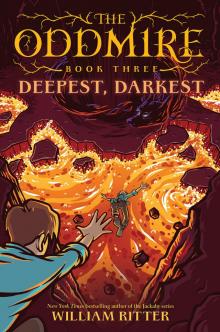 Deepest, Darkest
Deepest, Darkest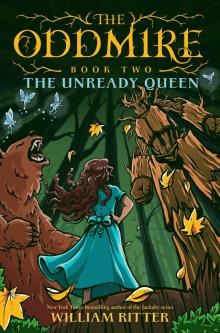 The Unready Queen
The Unready Queen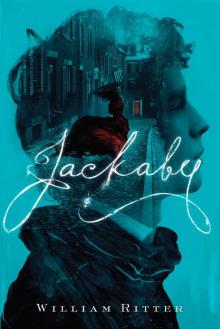 Jackaby
Jackaby Changeling
Changeling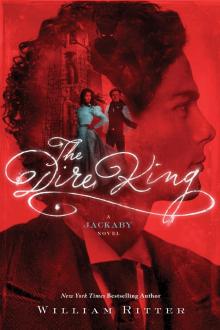 The Dire King
The Dire King Ghostly Echoes
Ghostly Echoes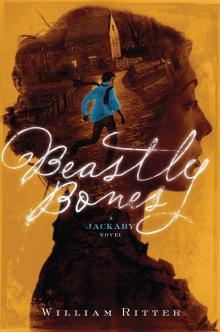 Beastly Bones
Beastly Bones